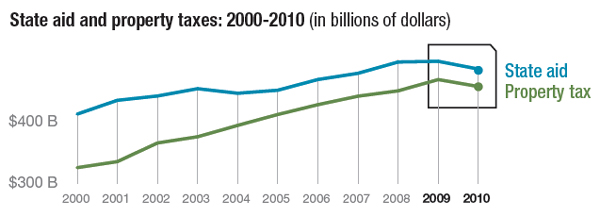The Pew Charitable Trust report, outlining the bleak context in which I’m trying to devise a dissertation research strategy. 2012 looks to be one of the worst years in the cities I’m studying since the early 2000s. City officials and the vast majority of workers are deeply entrenched in an ongoing recession, despite the fact that the “recovery” is officially old enough to be in preschool.
For the first time since 1980, both property tax revenue and state aid to local governments are declining at the same time. While cities and counties used to be able to count on at least one of those remaining positive, this current state of double decline is creating the most significant strain on the finances of local governments in a generation. And things probably aren’t going to get much better any time soon.
Local governments, for the most part, are combating these funding shortfalls by cutting spending. As a result, local services like public safety, trash collection, welfare and social services are being greatly reduced or even eliminated in some places.
Since 2008, about a half million public sector jobs have been eliminated, according to the report. Half of those were either teachers or other school officials. The report notes that 17 states since 2008 have reduced their per-student funding by more than 10 percent. And though some federal stimulus funding has prevented further cuts, that funding will expire later this year, leaving local governments with few options for avoiding even deeper cuts.
Local governments, though, have few options to counteract these reductions in revenue. For example, 46 states have laws that greatly restrict how much local governments can raise taxes.
And the fiscal problems facing local governments will likely be here for at least a few years, according to the report. Because some cities don’t assess their property taxes annually, the negative impacts of the housing market crash haven’t been fully felt.
“A lot of the downturn of the housing market is still working its way through the system and will be reflected in property taxes this year and next year,” Zahradnik says.
Moody’s Analytics predicts that average property tax revenues will decrease by another 4.4 percent during 2012.
Read: Cities Facing Worst Fiscal Situation Since 1980 – Jobs & Economy – The Atlantic Cities, June 2 2012
